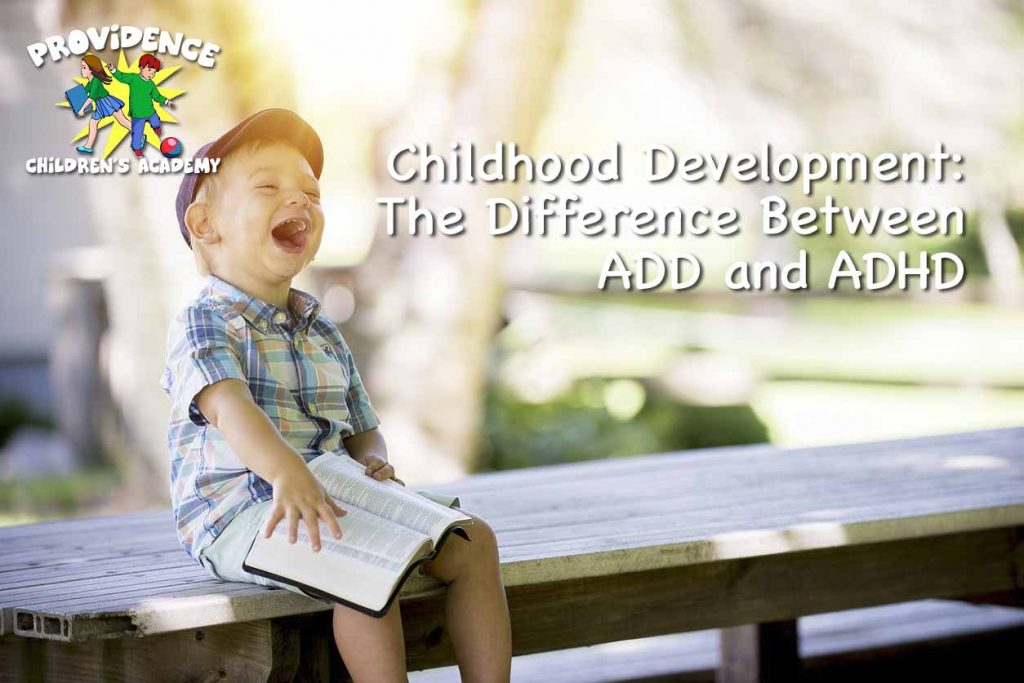
Understanding the difference between ADD and ADHD has become even increasingly necessary as more and more children are diagnosed with this condition. To the average person, hyperactivity is one thing while having a short attention span is another. In more serious cases, these tendencies are linked to childhood development conditions known as ADD and ADHD. These terms are often used interchangeably or confused and they are in fact somewhat different.
What Is ADHD?
ADHD refers to attention-deficit hyperactivity disorder. It is a condition that affects the brain and presents itself in children that appear to have difficulty controlling themselves and their behavior, paying attention and are possibly hyperactive.
Signs of ADHD In Children
If you suspect that your child may be suffering from one of the above types of deficits, you should look out for the following symptoms:
Hyperactivity
Behavior related to the inability to sit still and constant movement, fidgeting, busy chattering. Often times, this will occur in situations where it is not appropriate which further highlights the child’s inability to control such symptoms or behavior. Waiting their turn during activities is difficult.Impulsive Behavior
Without thinking of the consequences of their behavior, children will make impulsive decisions for instant reward. This includes interrupting teachers when they are speaking or bursting into a conversation between adults/parents. Children are unable to control their own behavior.Short Attention Span
Having a short-attention-span affects overall organization and invokes a sense of chaos. A child would have difficulty sticking to one task at a time and when attempting to do so daydreaming occurs and they’re unable to pay attention when they’re being spoken to.
What Is ADD?
ADD refers to attention deficit disorder. It is a type of ADHD but does not show signs of hyperactivity or the inability to sit still. ADD is a term that is not as commonly used anymore and this type of ADHD is rather referred to as “inattentive ADHD” because the child (or adult for that matter) does not suffer from hyperactivity as well, but suffers from disorganization, forgetfulness and an inability to focus.
Signs of ADD In Children
According to medical experts, identifying at least 6 of these symptoms in a child is cause for further investigation:
- Regular, careless mistakes
- Inability to listen when being spoken to
- Easily distracted
- Difficulty maintaining focus during schoolwork and other duties. Paying attention during social activities is also a problem
- Organizing tasks is difficult
- Inability to follow straight-forward instructions
- Losing things
- General forgetfulness
Children with ADD are often found to be very creative in nature, intuitive and expressive with positive energy. They prefer to be independent in thought patterns and are persistent in pursuit of what they want.
Seeking Help With ADHD Children
Because each case will differ from child-to-child it is difficult to appropriately point out whether he/she is suffering from ADHD. It becomes a concern when these symptoms affect the quality of life of a child as well as their ability to develop progressively when it comes to school readiness, for example. In a child, these symptoms will generally reveal themselves in environments like school, social situations or at home. If this is the case, we suggest approaching a professional for advice.
We’ve found that with overly hyperactive children, or children suffering from a type of ADHD, understanding this illness is the first step to creating a comfortable learning environment where their personalities and opportunities to grow are not stifled but rather managed and encouraged. Following a routine helps children to feel calmer, which goes hand-in-hand with giving them a place to go to when they need to calm down such as a quiet space. Organization has a big role to play in this because this can be difficult for a child to achieve on their own, which will leave them feeling chaotic. Children that struggle with ADHD can find simple activities boring and lose interest quickly. Activities should be engaging and thought-provoking to hold their interest.
One of the best things you can do for your child during this time is to communicate with their school, they spend a lot of time here and are subject to a lot of stimuli that could leave them feeling anxious and overwhelmed.
At Providence Children’s Academy, we place importance on understanding and catering to the needs of each of our students. Creating a nurturing learning environment forms part of our core mission. We believe that when learning is facilitated through specific and accommodating circumstances that every child has the opportunity to grow and thrive.
